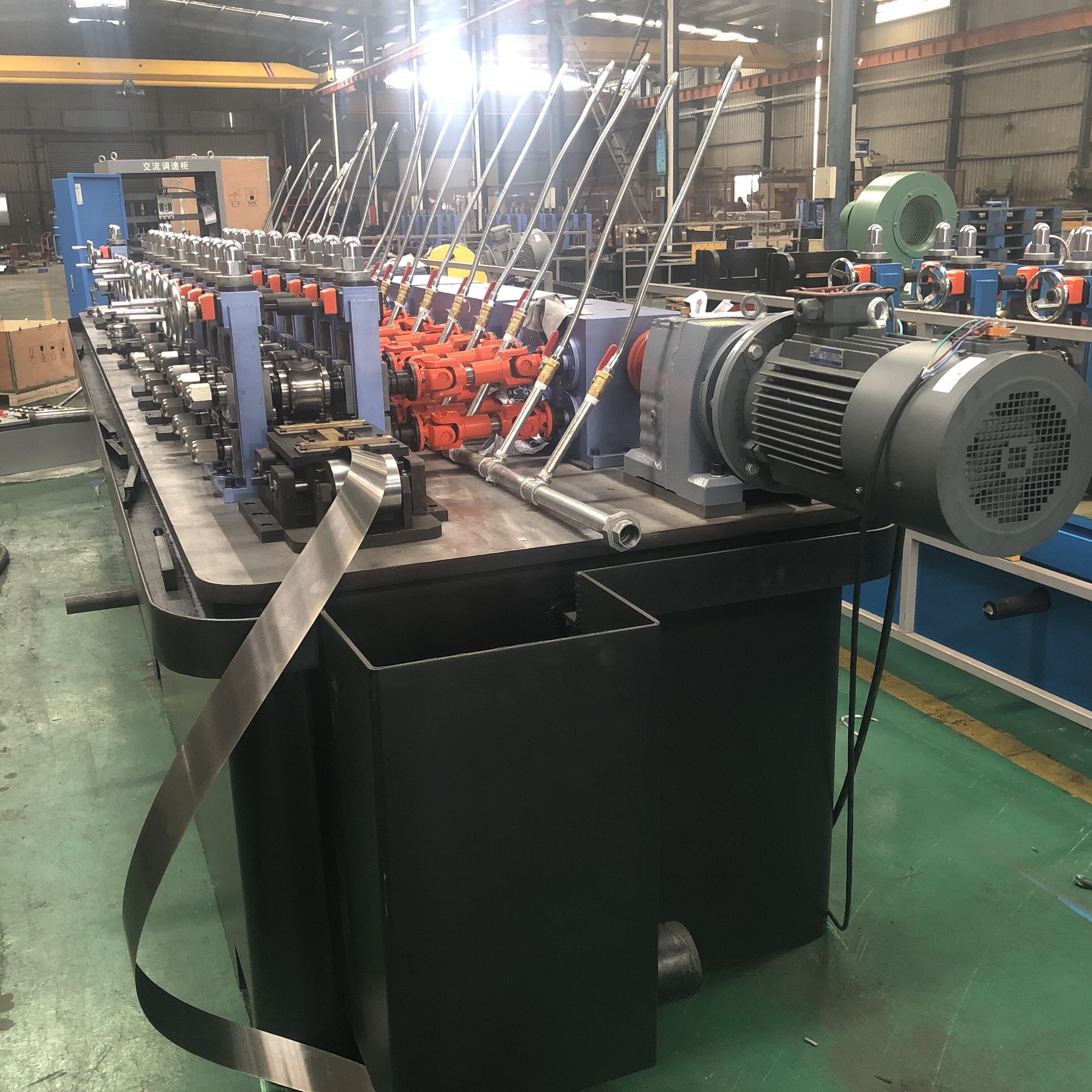Compreendendo o Processo Avançado de Fabricação de Tubos ERW
Tubos de solda por resistência elétrica ( ERW) representam um pilar fundamental da fabricação industrial moderna, produzindo tubos soldados de alta qualidade por meio de uma combinação sofisticada de processos mecânicos e elétricos. Essas instalações avançadas transformam bobinas planas de aço em tubos e tubulações precisamente soldados, utilizados em diversas indústrias, desde o transporte de petróleo e gás até aplicações estruturais. O processo de usina de tubos ERW destaca-se pela sua eficiência, consistência e capacidade de produzir tubos com excelente integridade de solda. representam um pilar da fabricação industrial moderna, produzindo tubos soldados de alta qualidade por meio de uma combinação sofisticada de processos mecânicos e elétricos. Essas instalações avançadas transformam bobinas planas de aço em tubos e tubulações soldados com precisão, utilizados em diversas indústrias, desde o transporte de petróleo e gás até aplicações estruturais. O processo de usina de tubos ERW destaca-se pela sua eficiência, consistência e capacidade de produzir tubos com excelente integridade da solda.
Componentes Principais de uma Fábrica de Tubos ERW
Sistemas de Desenrolamento e Preparação da Fita
A jornada começa na estação de desenrolamento, onde grandes bobinas de aço são cuidadosamente montadas em um desbobinador. Esta etapa inicial é crucial, pois estabelece a base para todo o processo de fabricação. O laminador de tubos ERW utiliza equipamentos especializados para garantir que a tira de aço se desenrole suavemente e mantenha uma tensão constante. Dançadores avançados e niveladores trabalham em harmonia para eliminar quaisquer problemas de curvatura da bobina ou ondulações nas bordas que possam comprometer a qualidade do produto final.
Após o processo de desenrolamento, a tira passa por uma preparação minuciosa. Máquinas de corte de bordas cortam com precisão a tira de aço na largura necessária, enquanto sistemas de limpeza da superfície removem quaisquer contaminantes ou carepas que possam afetar a qualidade da soldagem. Esta fase de preparação é essencial para alcançar condições ideais de soldagem e garantir que o tubo final atenda aos rigorosos padrões de qualidade.
Equipamentos de Formação e Soldagem
O coração de uma usina de tubos ERW está nas suas seções de conformação e soldagem. A fita de aço preparada passa por uma série de rolos formadores cuidadosamente projetados, que gradualmente a moldam em forma tubular. Esses rolos são posicionados e calibrados com precisão para garantir uma conformação uniforme, sem introduzir tensões excessivas ao material. O número e a configuração dos conjuntos formadores variam conforme o diâmetro e a espessura da parede do tubo produzido.
À medida que as bordas da fita se aproximam, equipamentos de soldagem de alta frequência geram calor intenso e localizado na junta. O sistema de soldagem da usina de tubos ERW aplica pressão cuidadosamente controlada para forjar as bordas aquecidas juntas, criando uma junta soldada contínua. Esse processo ocorre em velocidades notáveis, mantendo a qualidade constante da solda por meio de sistemas avançados de monitoramento e ajustes em tempo real.
Controle de Qualidade e Operações de Acabamento
Sistemas de Inspeção Online
Instalações modernas de usinas de tubos ERW incorporam tecnologias sofisticadas de inspeção ao longo da linha de produção. Equipamentos de teste ultrassônico monitoram continuamente a integridade da solda, enquanto testes de corrente parasita detectam quaisquer defeitos superficiais ou próximos à superfície. Esses métodos de ensaio não destrutivos garantem que cada polegada do tubo produzido atenda a rigorosos padrões de qualidade.
Sistemas de inspeção visual equipados com câmeras de alta resolução e algoritmos de inteligência artificial escaneiam a superfície do tubo em busca de imperfeições visíveis. Essa abordagem abrangente de controle de qualidade permite que os operadores identifiquem e solucionem possíveis problemas antes que se tornem críticos, mantendo alta eficiência de produção e garantindo a qualidade do produto.
Tratamento Pós-Soldagem e Dimensionamento
Após a soldagem, o tubo passa por várias etapas críticas de pós-processamento. Um sistema de tratamento térmico da solda normaliza a área soldada, garantindo propriedades mecânicas uniformes em toda a circunferência do tubo. Em seguida, laminadores de calibração ajustam com precisão o tubo às suas dimensões finais, enquanto equipamentos de retificação eliminam qualquer desvio em relação às especificações exigidas de retilineidade.
A seção de acabamento da linha de tubos ERW inclui instalações para corte de comprimento, faceamento das extremidades e operações de chanfro. Esses processos preparam os tubos para suas aplicações pretendidas e garantem que atendam às especificações dos clientes. Sistemas avançados de manipulação gerenciam cuidadosamente os produtos acabados para evitar qualquer dano durante essas etapas finais de processamento.

Sistemas de automação e controlo
Integração de Controle de Processo
As operações modernas de usinas de tubos ERW dependem fortemente de sistemas sofisticados de automação que coordenam todos os aspectos da produção. Controladores Lógicos Programáveis (CLPs) mantêm controle preciso sobre as configurações dos equipamentos, enquanto sensores avançados monitoram continuamente parâmetros críticos como temperatura, pressão e velocidade. Esse sistema de controle integrado garante qualidade consistente do produto, ao mesmo tempo que maximiza a eficiência da produção.
A coleta e análise de dados em tempo real permitem aos operadores otimizar os parâmetros de produção e prever necessidades de manutenção antes que ocorram falhas nos equipamentos. Os sistemas de controle da usina também mantêm registros detalhados de produção, facilitando a certificação de qualidade e os requisitos de rastreabilidade para cada tubo fabricado.
Controles de Segurança e Ambientais
Instalações modernas de usinas de tubos ERW incorporam sistemas abrangentes de segurança para proteger tanto o pessoal quanto os equipamentos. Procedimentos de desligamento de emergência, sistemas de controle de acesso e medidas avançadas de proteção contra incêndios garantem operação segura sob todas as condições. Sistemas de controle ambiental gerenciam emissões, reciclagem de fluidos refrigerantes e tratamento de resíduos para manter a conformidade com as regulamentações ambientais, minimizando ao mesmo tempo o impacto ecológico da instalação.
A integração desses controles de segurança e ambientais aos sistemas principais de produção cria uma abordagem holística para a fabricação moderna de tubos. Isso garante operação sustentável, mantendo os mais altos padrões de segurança dos trabalhadores e responsabilidade ambiental.
Perguntas Frequentes
Quais são as velocidades típicas de produção de uma usina de tubos ERW?
As laminadoras de tubos ERW podem alcançar velocidades de produção variando entre 20 e 200 metros por minuto, dependendo do diâmetro do tubo, espessura da parede e classe do material. Essas velocidades são possíveis graças à sincronização precisa de todos os componentes da laminadora e sistemas de controle avançados que mantêm parâmetros operacionais ideais.
Como uma laminadora de tubos ERW garante qualidade constante da solda?
A qualidade constante da solda é obtida por meio de uma combinação de controle preciso de temperatura, aplicação de pressão e sistemas de monitoramento contínuo. Os parâmetros de soldagem de alta frequência são ajustados automaticamente com base em feedback em tempo real de múltiplos sensores, enquanto equipamentos avançados de teste verificam a integridade da solda durante todo o processo de produção.
Quais materiais podem ser processados em uma laminadora de tubos ERW?
As laminadores de tubos ERW normalmente processam aço carbono e várias ligas de aço. A seleção do material depende da aplicação pretendida dos tubos acabados, com capacidades que variam desde graus estruturais padrão até materiais especializados para aplicações em ambientes de alta pressão e corrosivos.
